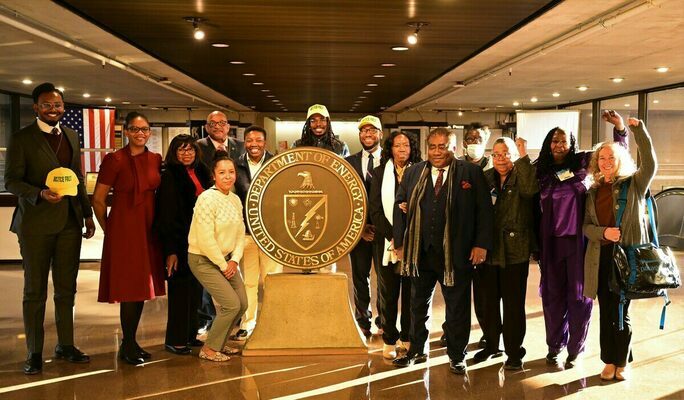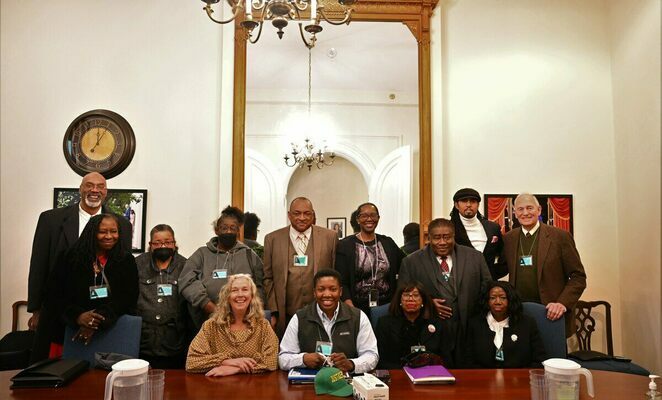Southeast Leaders Seek Justice In D.C.
On January 30th a delegation of community and environmental justice leaders from the southeast, and their allies in the northeast, visited Washington D.C. to discuss several issue they say are worsening in southeast communities of color. Those issues included the expanding biomass wood pellet industry, increasing climate change impacts, clear cutting and other widespread logging practices that are increasing climate change impacts, worsening air quality issues, both in environmental justice forested communities and urban fence line communities.
They also discussed several other issues and the need for funding and other types of support for communities that have implemented community led solutions. The delegation members consisted of Dr. Treva Gear, The Concerned Citizens of Cook County, in Adel, Georgia, Deborah David, and Deborah Scott of the Concerned Citizens of Richmond County, North Carolina, Reverend Leo Woodberry of New Alpha Community Development Cooperation, South Carolina, Loretta Slater, The Whitney M Slater Foundation, Florence, South Carolina. Varis Woodberry, Kingdom Living Temple, South Carolina Christine B. Anderson, also of New Alpha Community Development Corporation, and Anthony Hall, the Democracy center, Florence, South Carolina.
The group of Southeast leaders were joined by allies, such as Dr. Bill Moomaw of Tufts University and Aaron Mair of the Adirondack Council, both representing Massachusetts, New York, and other northeastern states. The delegation visited 16 members of Congress's offices. Those members of Congress were:
• Senator Graham (R-SC)
• Rep. Bennie Thompson (D-MS)
• Sen. Tim Scott (R-SC)
• Senator Tillis (R-NC)
• Senator Budd (R-NC)
• Rep. Clyburn (D-SC)
• Sen. Warnock (D-GA)
• Sen. Gillibrand (D-NY)
• Rep. Mace (R-SC)
• Sen. Ossoff (D-GA)
• Rep. Dan Bishop (R-NC)
• Rep. Don Davis (D-NC)
• Senator Markey (D-MA)
• Senator Warren (D-MA)
• Congressman Ro Khanna (D-CA)
Visits were also made to the Department of Energy where the need for affordable electric vehicles, particularly in communities with poor air quality as well as the need for affordable electric vehicles and charging stations in environmental justice communities were discussed.
There was a meeting with the Environmental Protection Agency to discuss environmental justice issues around poor air quality, the expanding biomass industry in North Carolina, South Carolina, Georgia, Alabama, and Mississippi. A conversation was also held around community led solutions, increasing climate impacts, brownfields, and many of the issues. The delegation asked that the EPA join in with the inter-agency advisory committee so that inter-sectional issues that come from flooding, hurricanes, tornadoes, etc. can be addressed as a continuum rather than in a siloed approach leaving many people impacted by weather related disasters in need of help, and with no direction to who can provide that help on the federal level.
The delegation also met at the White House with the Council on environmental quality. There the same issues were discussed as previously mentioned with the request to have clarification around what funding from the bipartisan bill, the conversation also included the need to meet with the inter-agency advisory council to continue discussion with representatives from the White House CEQ as well as discussion around identifying what types of funding were targeted for environmental justice organizations and with groups that have or are implementing community led solutions and how those particular grants and other types of funding can be clearly identified. After the very robust discussion, agreement was made to continue discussion and dialogue with representatives from the Congressional members offices, the agencies, and the White House.
Anyone seeking additional information regarding the visit to Washington DC can email info at www.newalphacdc.com or call (843)799-0740.
Please support The Community Times by subscribing today!
You may also like:



